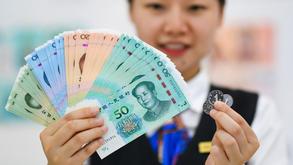 A woman shows banknotes and coins included in the 2019 edition of the fifth series of the renminbi. (PHOTO / XINHUA)
A woman shows banknotes and coins included in the 2019 edition of the fifth series of the renminbi. (PHOTO / XINHUA)
The electronic yuan, or e-CNY, is the digital version of fiat currency issued by the China's central bank, and operated by authorized agents. It is a value-based, quasi-account-based, and account-based hybrid payment instrument with legal tender status and loosely covered account linkage.
According to an official document on the development of e-CNY in China, issued by the Working Group on E-CNY Research and Development of the People's Bank of China in July 2021, one of e-CNY's main goals is to expedite the internationalization of the digital yuan.
Based on accurate and real-time information, the new technology will also make Chi-na’s economic policy more suited to curbing corruption and money laundering
Equivalent to paper currency bills and coins, e-CNY will meet people's demand for digital currency and help develop financial services in the country. And given China's strong production capacity and spending power, e-CNY will help build a new trading pattern, which in turn will help boost global cooperation.
The e-CNY has all the basic functions of money, that is, unit of account, medium of exchange and store of value, and its issuance and circulation is almost identical to the physical yuan's-only that instead of being physically transferred, it will be transferred in a digital form.
The central government and its departments attach great importance to the development of digital currency. They have introduced a series of preferential policies for e-CNY and included it into the 14th Five-Year Plan (2021-25). They have also urged governments at all levels to start testing the digital currency, with the aim of expanding its coverage and assessing its impact on the country's monetary policy and financial system, and, if need be, improving the digital currency's operations.
Since May 2020, the country has made remarkable progress in promoting the central bank digital currency. Initially, cities began trials by giving people digital envelopes with e-CNY to spend. A year later, the digital yuan entered third-party payment platforms and began online e-CNY payment trials-for example, passengers could pay for public transport by scanning a QR code for the digital currency.
As e-CNY's usage expands, the average number of times people using it per day rises. As of December 2021, the per capita usage time reached 5.6 minutes, and the per capita daily activation times fluctuated between 2-3 times. Compared with the existing payment and settlement industry, there is still a lot of room for improvement. In the future, with the continuous development of e-CNY application scenarios and supporting platforms, consumer stickiness will be greatly improved. And by the end of February this year, about 16.95 million e-CNY apps had been installed.
However, there is still a big gap between e-CNY payments and traditional modes of payments.
The benefits of boosting the use of e-CNY are obvious. First, it will meet people's demand for fiat digital currency for mobile payments and lower, if not remove, the barriers to access financial tools and services. Based on accurate and real-time information, the new technology will also make China's economic policy more suited to curbing corruption and money laundering.
Second, e-CNY will accelerate the yuan's internationalization process, as its point-to-point and end-to-end payment feature will lower the costs of cross-border transactions and make them more efficient. And with a growing number of countries issuing their own digital currencies, people will see a big transformation in business and finance, with cross-border digital currency payments becoming fairer and faster.
However, some problems need to be solved before e-CNY can be used widely across the country. More sophisticated technology and tools are required to ensure the transactions are safe and efficient, and a market-oriented mechanism is needed to make regulators, commercial banks, and local governments better collaborate to promote the digital currency across the country. Also, more incentives should be given to people and businesses so they cultivate the habit of paying with the digital currency.
With wider acceptance, the e-CNY is expected to greatly improve in the future.
The author is deputy director of the National Institution for Finance and Development.
The views don't necessarily represent those of China Daily.


